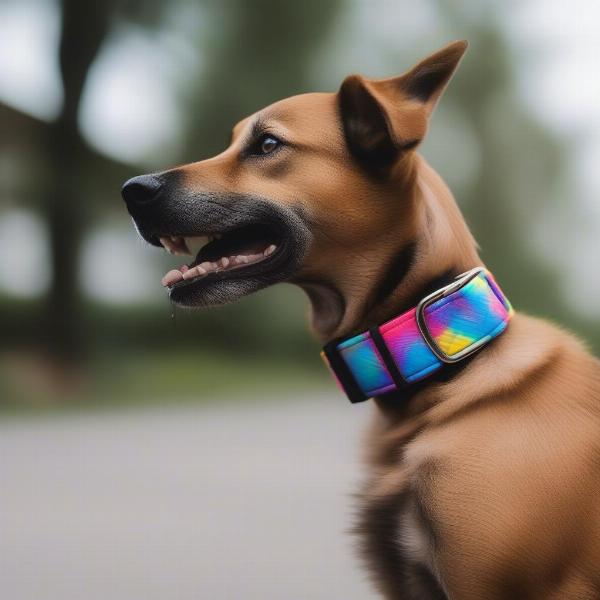A chew proof dog collar is a must-have for many dog owners, especially those with teething puppies or dogs who love to gnaw. Choosing the right one can save you money, frustration, and even protect your dog’s safety. This guide dives deep into everything you need to know about chew proof dog collars, from materials and features to choosing the perfect fit.
What Makes a Collar Chew Proof?
Not all collars marketed as “chew proof” are created equal. Some are more resistant to chewing than others. Understanding the materials used is key to finding a truly durable collar.
Common Chew Proof Materials
- Metal: Metal chain collars are typically very durable, but can be heavy and not suitable for all dogs.
- Nylon: High-quality nylon webbing can be incredibly strong and resistant to chewing, especially when reinforced with multiple layers.
- Biothane: This coated webbing material is waterproof, odor-resistant, and highly durable, making it a popular choice for chew proof collars.
- Leather: While not entirely chew proof, thick, high-quality leather collars can offer some resistance to chewing and soften with age, becoming more comfortable.
Choosing the Right Chew Proof Collar for Your Dog
Selecting the best chew proof dog collar involves considering your dog’s breed, size, chewing habits, and activity level.  A dog happily wearing a chew proof collar.
A dog happily wearing a chew proof collar.
Sizing and Fit
A properly fitted collar is essential for both comfort and safety. It should be snug enough that it won’t slip over your dog’s head, but loose enough to fit two fingers comfortably between the collar and your dog’s neck.
Consider Your Dog’s Chewing Habits
If your dog is a powerful chewer, you’ll need a truly robust collar made from a material like Biothane or metal. For milder chewers, reinforced nylon may suffice.
Activity Level
A highly active dog will need a collar that can withstand the wear and tear of their adventures. Look for collars with durable hardware and stitching.
Alternatives to Chew Proof Collars
If you’re struggling to find a suitable chew proof collar, or your dog continues to chew through everything, there are other options to explore.
Addressing the Underlying Chewing Behavior
Chewing can be a sign of boredom, anxiety, or teething. Providing plenty of appropriate chew toys can help redirect their chewing habits. chew proof collars for dogs are great, but sometimes the root cause of chewing needs to be addressed. Training and mental enrichment activities can also help alleviate boredom and anxiety. Consider long lasting chews for dogs to keep them occupied.
Training Aids
A head halter or harness can provide more control and discourage pulling, which may be contributing to the collar chewing.
Maintaining Your Chew Proof Collar
Even the toughest collar will eventually show signs of wear. Regular cleaning and inspection can extend its lifespan.
Cleaning Tips
Clean your dog’s collar regularly with mild soap and water to remove dirt and grime.
Inspection
Check for any signs of fraying, cracking, or broken hardware. Replace the collar if you notice any damage.
Conclusion
Choosing a chew proof dog collar is an investment in your dog’s safety and well-being. By understanding the different materials, considering your dog’s individual needs, and addressing any underlying chewing issues, you can find the perfect collar to keep your furry friend safe and comfortable. Remember to always supervise your dog, especially when they are wearing a new collar, and to replace the collar as soon as it shows signs of wear. Choosing the right chew proof dog collar is a crucial step in responsible dog ownership.
FAQ
- Are metal chew proof collars safe for all dogs? While generally durable, metal collars can be heavy and unsuitable for small breeds or dogs with sensitive skin or tracheal issues.
- What should I do if my dog continues to chew through their collar? Address the underlying chewing behavior by providing appropriate chew toys, training, and mental enrichment. Consider alternatives like harnesses.
- How often should I clean my dog’s collar? Clean it regularly with mild soap and water, especially after muddy or messy outings.
- How do I know if my dog’s collar fits properly? You should be able to fit two fingers comfortably between the collar and your dog’s neck.
- What’s the best material for a chew proof collar? The best material depends on your dog’s individual needs. Biothane and metal are highly durable, while reinforced nylon is a good option for moderate chewers.
- Can a chew proof collar help with training? While not a training tool in itself, a durable collar can provide a secure point of attachment for a leash during training.
- Where can I find chew proof dog collars? Pet stores, online retailers, and specialized dog supply stores all carry chew proof collars.
Related Articles:
About ILM Dog:
ILM Dog is your one-stop resource for expert advice on dog care, covering everything from breed selection and health to training, nutrition, and grooming. We provide practical, trustworthy information to help you raise a happy, healthy dog. Whether you’re a new dog owner or a seasoned pro, we’re here to support you every step of the way. Contact us today at [email protected] or +44 20-3965-8624 for personalized advice and recommendations on the best products and accessories for your furry friend.